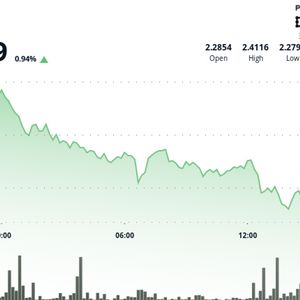Binance’s Role in Kenyan Crypto Board Sparks Monopoly Debate
5 min read
Critics argue that VAC’s close financial ties to Binance—and reportedly receiving $6,000 per country for advocacy—create a very clear conflict of interest that could skew Kenya’s crypto regulations in favor of the global exchange. This could potentially sideline local players and damage Kenya’s reputation with global watchdogs like FATF. Meanwhile, Binance continues its international expansion, and completed the Maxwell upgrade on BNB Chain to reduce block times and improve network efficiency. At the same time, Coinbase was named one of TIME’s 100 Most Influential Companies due to its growing influence in shaping US crypto policy. Kenya’s Crypto Bill Draws Fire Over Binance Ties Kenya’s proposed Virtual Asset Service Providers (VASP) Bill started controversy among local crypto startups, due to the growing concerns that it may hand too much influence to a Binance-linked lobby group. This could potentially undermine fair competition in the country’s digital asset market. According to a report by The Kenyan Wall Street, the draft legislation includes a provision for a private think tank called the Virtual Asset Chamber of Commerce (VAC) to hold a seat on the new regulatory board. However, several stakeholders claim that VAC operates as a proxy for Binance and lacks the independence necessary to act in the best interests of Kenya’s broader crypto ecosystem. Critics argue that VAC’s recent regulatory consultations have been heavily sponsored by Binance and allege that the group has a non-compete clause with the exchange. These revelations triggered fears that the draft law could tilt Kenya’s regulatory landscape in favor of Binance, and marginalize local players. One person also questioned the constitutionality of granting VAC a formal regulatory role under these circumstances, as arrangement could lead to biased policy outcomes. The report further claims that Binance pays VAC $6,000 per country each month for advocacy work. Stakeholders warn that this financial arrangement creates a clear conflict of interest that could potentially harm Kenya’s international regulatory standing and hinder efforts to exit the Financial Action Task Force (FATF) and EU greylists. Similar concerns reportedly arose in Rwanda, where VAC allegedly attempted to influence crypto policy as well. In response, VAC director Basil Ogolla defended the group’s credibility by pointing to two years of engagement with the International Monetary Fund (IMF), the Central Bank of Kenya (CBK), and Parliament. He stated that the National Assembly’s decision to include VAC on the board reflects its commitment to responsible consultation. The new regulatory board will also include officials from the National Treasury, CBK, and Capital Markets Authority (CMA), alongside a lawyer and an accountant. Binance has been expanding its government relations globally. In May, the exchange signed a memorandum of understanding with Kyrgyzstan to develop crypto infrastructure and blockchain education. Binance CEO Richard Teng also revealed in April that several governments and sovereign wealth funds approached the company for guidance on establishing Bitcoin reserves and crafting national crypto policies. BNB Chain Slashes Block Times in Maxwell Upgrade Despite the growing tensions in Kenya, Binance is reaching new milestones. BNB Smart Chain successfully completed its Maxwell hard fork, which is a major upgrade that cut average block times nearly in half—from 1.5 seconds on Monday to just 0.8 seconds. The Maxwell upgrade went live on June 30 at 2:30 am UTC, and is part of BNB Chain’s ongoing efforts to boost network performance, scalability, and developer experience. According to the BNB Chain team, this latest hard fork is a major technical advancement rather than just another routine update. It is expected to make transactions faster, improve validator coordination, reduce latency for decentralized finance applications, and create a more responsive environment for decentralized app developers. The upgrade follows a successful testnet deployment that was launched on May 26. The Maxwell hard fork introduced three major improvement proposals—BEP-524, BEP-563, and BEP-564. The main goal of BEP-563 is to enhance peer-to-peer messaging between validators by enabling quicker block proposal communication and improving validator stability. This reduces the likelihood of missed votes or delays, both of which are critical in achieving the new target block time of 0.75 seconds. BEP-564 introduces two new message types—GetBlocksByRangeMsg and RangeBlocksMsg—that allow multiple blocks to be requested and delivered in a single transaction. This is expected to greatly accelerate synchronization speeds across the network. Meanwhile, BEP-524 focuses on reducing block times , continuing the improvements that were made by the Lorentz upgrade in April, which had already cut block times from three seconds to 1.5 seconds. The Maxwell update brings that time even lower. The BNB Chain team advised developers to test their applications under the faster block timing and refactor any components that rely on the previous 1.5-second intervals. They warned that any issues post-upgrade would likely stem from app-level code rather than the blockchain itself. BNB’s price action over the past week (Source: CoinMarketCap ) BNB’s native token saw a price increase ahead of the upgrade, and climbed by 5.97% over the past week. At press time, BNB was trading at around $654.22, up 0.48% in the last 24 hours. Coinbase Named in TIME’s 100 Most Influential Companies Another crypto exchange, Coinbase, recently turned heads after it was named one of TIME’s 100 Most Influential Companies of 2025 . It also earned the label of “disruptor” for its influence on crypto policy and regulation in the United States. (Source: TIME ) The recognition comes as the company is gaining traction both on Wall Street and within political circles. Coinbase’s stock rose by approximately 37% year-to-date, with an impressive surge after the Senate’s approval of the GENIUS stablecoin bill on June 17. The announcement helped propel Coinbase shares from around $303 to a local high of $382. TIME pointed out Coinbase’s milestone inclusion in the S&P 500 index in May, and called it a key driver of crypto policy efforts in Washington and a potential future hub for US-based crypto activity, especially if favorable regulations continue to pass. In addition to its domestic advances, Coinbase is aggressively expanding its international footprint. The company reportedly applied to the US SEC for permission to offer tokenized equities to its users, a move that would position it as a direct competitor to traditional brokerage platforms like Robinhood and WeBull. If approved, this expansion would bring mixed asset trading capabilities to the Coinbase ecosystem, which will help cement its role as a comprehensive financial platform. Internationally, Coinbase secured a regulatory license on June 20 under the European Union’s Markets in Crypto-Assets (MiCA) framework. The license was granted by Luxembourg’s financial regulator, and it will enable Coinbase to operate its digital asset services across EU member states and establish its European headquarters in Luxembourg.

Source: Coinpaper



